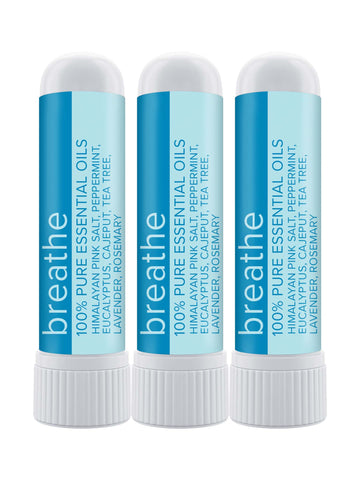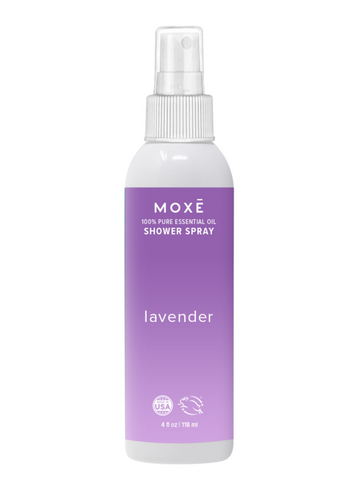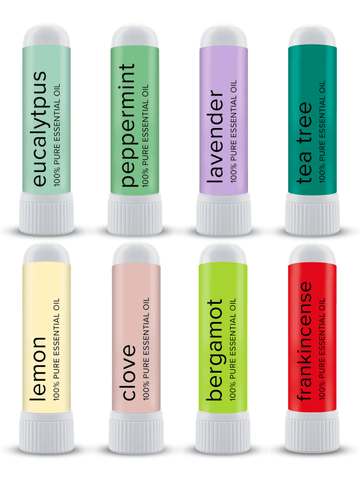
by
What comes to mind when you encounter the phrase “staying healthy”?
Perhaps most times, it's all about healthy eating and losing weight.
What about your lungs and your entire respiratory system? Only a handful considers the lungs in their quest to “stay healthy.” We often take for granted the complexities of our respiratory system until it gets out of wack that we seek treatments or remedies to maintain healthy function.
While prescription drugs such as corticosteroids and bronchodilators medications are available if needed, is there a natural way to prevent respiratory dysfunction and maintain a healthy respiratory system? Well, according to some research, essential oils may help to support a healthy respiratory system.
In this article, we look at 7 essential oils that support a healthy respiratory system.
TLDR: Peppermint, Eucalyptus, Cajeput, Tea Tree, Rosemary, and Lavender essential oils are shown to support a healthy respiratory system. All of these oils are used in MOXĒ Breathe blend that is ready to use.
Respiratory system
Your respiratory system, including the lungs, windpipe, throat, and nose, channel oxygen into the body when you breathe.
Air intake [during breathing] goes into the lungs from where it’s delivered to the bloodstream for distribution throughout the body, which technically fuels life.
One distinguishing feature of the lungs is that, unlike most organs, the lungs feature delicate tissues which receive 'food' directly from the external environment.
Obviously, breathing matters! This is why public health officials launch campaigns against harmful substances like dust, chemicals, tobacco smoke. These toxic substances can trigger dreaded conditions like allergies, pneumonia, asthma, COPD, and worse cases like lung cancer.
How is our respiratory system weakened?
The fact is, even without these unhealthy factors that endanger our lungs and respiratory system, just like your joints, skin, heart, eyes, and other organs in the body, the lungs weaken as we age.
As you age, the respiratory tissues lose strength and become less flexible, causing different levels of breathing difficulty.
Just as some habits and indulgence can put our respiratory system in harm’s way, the opposite is true. Natural habits and practices can help your lungs stay healthier. Among these natural practices include inhaling essential oils, as researchers suggest oils could provide respiratory system support.
Can essential oils help in the treatment of respiratory tract diseases?
Current research studies suggest they could help!
Certain essential oils have been regularly mentioned in the search for a more natural approach to keep the respiratory tract healthy. Studies suggest these essential oils may have some clinical promises for cold, cough, and related respiratory symptoms, by reducing inflammation and combating bacteria.
Some essential oils contain aromatherapeutic compounds known as monoterpenes, including d-limonene, 1,8-cineole, and alpha-pinene. Several studies show evidence that oils with these chemical properties support respiratory health.
How does breathing in essential oils help with respiratory health?
Researchers say the aroma from your oils, when inhaled, activates a part of your limbic system - a section of your brain responsible for behaviors, emotions, long-term memory, and sense of smell.
The limbic system plays a major role in creating memories. This is why a familiar aroma can easily take you back in time or evoke deep emotions.
Interestingly, the limbic system is heavily involved in modulating certain physiological functions, like heart rate, breathing, and blood pressure. This partly explains why many essential oils provide an aromatherapeutic role.
Best essential oils to support a healthy respiratory system
1. Peppermint Essential Oil
This is one common herb mentioned in aromatherapeutic discussions. Peppermint oil is a menthol-rich essential oil great for congestion, cough, and related respiratory relief.
While research authors are yet to conclude how peppermint essential oil eases respiratory symptoms, users report clearing and invigorating effect that helps with breathing.
Current research studies suggest that peppermint’s high menthol content works as a decongestant by helping to loosen up mucus that has collected in the lungs.
2. Eucalyptus Essential Oil
Among its many benefits, eucalyptus essential oil is prized for its ability to support the respiratory system.
This oil is thought to deal with certain bacteria that trigger respiratory issues like cough and concerns like bronchitis, pharyngitis, and sinusitis. Most pharmaceutical prescriptions for congestions infuse eucalyptus oil. Another study found eucalyptus oil to be an effect at inhibiting tuberculosis in lab bench studies.
Eucalyptus oil is often used in many spa products such as aromatherapy showers mists as it promotes clear breathing.
3. Cajeput Essential Oil
Cajeput essential oil has a similar scent as eucalyptus, so it no surprise that it has similar therapeutic values.
Direct inhalation of cajeput oil is discouraged. Instead, diffuse the cajeput oil in a room using a diffuser or try it in a diluted form, such as a nasal inhaler. With this approach, you can get relief from headaches and respiratory congestions.
Interestingly, ongoing research is looking at the potentials of cajeput essential oil for inhibiting the COVID-19 virus.
4. Tea Tree Essential Oil
Next up is Tea Tree! Tea Tree has several aromatherapeutic benefits.
In fact, many Australian natives have used Tea Tree leaves for hundreds of years. They typically would crush the leaves of this plant and use the oil for relief from colds and coughs. Tea Tree essential oil is thought to provide similar antitussive or anti-coughing effects.
Scientifically called Melaleuca, tea tree oil can stop the growth of unhealthy bacteria, which help with sinus infections and other respiratory concerns.
5. Rosemary Essential Oil
Rosemary oil provides a calming effect to your trachea muscles, offering relief to your respiratory system.
Rosemary has also been found to manage asthmatic symptoms. This oil is typically mixed with carrier oils and applied topically on the skin.
For respiratory relief, rosemary essential oil should be diluted before inhalation.
7. Lavender Essential Oil
The famous oil Lavender has been used to suppress coughing in alternative medicine treatments. It may as well help some asthma-related respiratory symptoms, according to some research.
In support, a study shows that inhaling lavender oil clears off airway blockage triggered by bronchial asthma.
You can inhale lavender by infusing your oil into a bowl of steaming water or a warm bath.
For the best effect, consider a pre-made quality lavender-themed diffuser.
MOXE Breathe Blend for Respiratory support
The fastest way to start supporting your respiratory health with essential oils is to use MOXE Breathe blend. MOXE Breathe is made by our passionate team of scientists in our facility right here in the United States! The blend of essential oils works to help open your airways. Luckily, you can use MOXE Breathe in many forms that best suit your lifestyle. Here are your options.
The Many ways of using MOXE Breathe
MOXE Breathe products are effortless to use. Here are the simple steps:
The fastest way to start supporting your respiratory health with essential oils is to use MOXE Breathe blend. MOXE Breathe is made by our passionate team of scientists in our facility right here in the United States! The blend of essential oils works to help open your airways. Luckily, you can use MOXE Breathe in many forms that best suit your lifestyle. Here are your options.
The Many ways of using MOXE Breathe
MOXE Breathe products are effortless to use. Here are the simple steps:
Nasal inhaler
Simply hold your MOXE Breath Nasal Inhaler near your nose and inhale gently. Do this for both nostrils.
Our nasal inhaler is recommended for use at least once daily. However, it’s safe to use it frequently, as desired.
Shower spray
Our essential oil-infused shower spray is pretty easy to use. For the best results, spray into the shower stream and shower walls. You'll feel the immediate invigorating and refreshing aroma filling your entire bathroom. Repeat your sprays as desired.
While spraying, direct away from your face and remember the oil can cause shower surfaces and tub to become slippery.
Essential oil blend
Our carefully selected essential oil blend is effortless to use. Simply add about 5 to 10 drops to a diffuser and expect a purifying and cleansing aromatherapy effect over your room space.
Remember to keep out of the kid's reach. Also, discuss with your healthcare provider if you are pregnant, a nursing mother, or have some health conditions.
Also, avoid skin and eye contact as these are 100% essential oils and are potent!
Is it safe to breathe essential oils?
Inhalation is one of the mildest, safest, and fastest ways to administer essential oils for respiration effects. However, caution is advised when using essential oils.
Note that certain oils are notably harsh and can be toxic if not well diluted.
That said, ensure you diffuse your essential oils in well-ventilated areas and ensure pets are not confined to the room - on the off chance that they do not appreciate the aroma, they should be free to leave.
Always follow the manufacturer's guidelines on product labels.
Tips for maintaining a healthy respiratory system
Real talk here. Essential oils are fantastic and offer many benefits to your respiratory system if used correctly. However, these oils are not a remedy for harmful lifestyle habits and cannot undo years of poor health choices. Take care of your lungs, and they will take care of you.
Here are helpful tips from public health officials for keeping your lung health in tip-top shape.
Quit smoking
Cigarette smoking is considered the chief cause of chronic obstructive pulmonary disease (COPD) and lung cancer. The fact is, any form of smoke inhalation is toxic to your lung health.
Over time, smoke damages the delicate lung tissues which in turn encourages the growth of cancerous cells. If you still smoke, quitting could do your lungs [and overall health] a lot good.
Ready to quit? The American Lung association can walk you through helpful tips.Keep air around you clean
Chemicals in the home, secondhand smoke is unhealthy for the lung. So, ensure your car and home are pollutant-free. When pollution is high outdoors, do not exercise outside. If you suspect a pollutant in your home, work, or school, discuss it with your healthcare provider.
Prevent infections
To prevent cold and other respiratory infections, here are some protective tips:
- Regular hand wash with soap and water or consider a good quality alcohol-based hand sanitizer when water and soap are unavailable.
- Keep crowds at bay during flu and cold season.
- Maintain good oral hygiene. Wash your mouth at least twice daily.
- Get influenza vaccinations yearly.
- If you feel sick, keep a distance [until you feel better] to protect those around you
Do routine checkups
Even though you feel well, regular checkups help detect early signs of respiratory issues for quick action.
Exercise
Regardless of your age, size, or health condition, exercise is a universal health language. Staying physically active helps your lung stay healthy.
Known when to seek medical attention
While essential oils are good natural alternatives to alleviate your respiratory problems, you may have to take a break and seek more professional consultations when things seem ' out of hand.'
If you experience a flare-up that messes up your respiratory tract, causing shortness of breath, seek medical attention immediately.
For clarity, consult an experienced medical professional as soon as possible if you notice any of these symptoms:
- Brown or green mucus
- Blood in your mucus
- Dizziness
- Excessive wheezing or coughing
- Forgetfulness
- Unexplained sudden weight gain or loess
- Swelling in wrists and ankles
- Shortness of breath
- General difficulty breathing
Takeaway
There you go - 7 essential oils that support a healthy respiratory system.
Peppermint, Eucalyptus, Cajeput, Tea Tree, Rosemary, and Lavender essential oils are a few oils shown to help keep your lung and respiratory system healthy.
The quickest way to start using these oils for respiratory support is to buy a premade blend featuring Peppermint, Eucalyptus, Cajeput, Tea Tree, Rosemary, and Lavender essential oils.
Further questions on essential oils and safest application methods? Feel free to discuss this with us. Our experts will gladly assist and ensure you make the safest purchase decision.
 Free Shipping within the Continental U.S.
Free Shipping within the Continental U.S.









